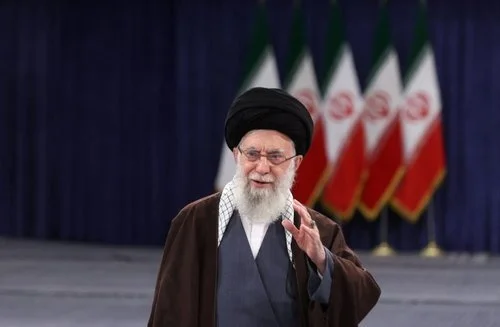Iranian supreme leader orders direct strikes on Israel
Supreme leader of Iran Ayatollah Ali Khamenei.
IRAN’s Supreme Leader Ayatollah Ali Khamenei has issued an order for direct strikes on Israel, in retaliation for the killing in Tehran of Hamas’s political leader Ismail Haniyeh, The New York Times has reported citing three Iranian officials.
Mr Khamenei gave the order at an emergency meeting of Iran’s Supreme National Security Council, shortly held after announcement of Mr Haniyeh’s killing, said the three officials, including two members of the Revolutionary Guards. They asked their names not be published because they were not authorised to speak publicly.
Iran and Hamas accused Israel of the assassination; Israel, currently at war with Hamas in the Gaza Strip, has neither denied nor acknowledged killing Mr Haniyeh, who was in Tehran for the swearing-in of Iran’s new president. Israel has a history of killing officials abroad, targeting Iranian nuclear scientists and military officers.
Throughout the nearly 10-month battle in Gaza, Iran has attempted to strike a balance, exerting pressure on Israel with substantially escalated strikes by its allies and proxy forces in the region while avoiding an all-out war between the two countries.
In April, Iran launched its largest and most dramatic attack on Israel in decades of hostility, launching hundreds of missiles and drones in response to an Israeli raid on its embassy compound in Damascus, Syria, which killed many Iranian military officers. Even that display of power was expertly planned, and Israel and its allies shot down virtually all of the weapons, resulting in minimal damage.
Visuals from Iran’s last direct attack on Israel on 13th April, 2024.
It is uncertain how aggressively Iran will respond to Haniyeh’s murder, or whether it will again calibrate its attack to avoid escalation. Iranian military leaders are preparing another drone-and-missile attack on military facilities near Tel Aviv and Haifa, but they will avoid strikes on civilian targets, according to Iranian authorities. One option being considered is a coordinated attack by Iran and other fronts where it has allied forces, such as Yemen, Syria, and Iraq, for maximum effect, they claimed.
Mr Khamenei, who has the final say on all state matters and is also the commander in chief of the armed forces, has directed military commanders from the Revolutionary Guards and the army to prepare plans for both an attack and a defence in the event that the war escalates and Israel or the United States strikes Iran, according to officials.
In his public speech regarding Mr Haniyeh’s death, Mr Khamenei indicated that Iran would retaliate immediately, saying, "We see avenging his blood as our duty," because the incident occurred on Islamic Republic territory. He claimed Israel had laid the stage for "a severe punishment."
Other Iranian authorities, including the new president, Masoud Pezeshkian, the foreign ministry, the Guards, and Iran's representation to the United Nations, have openly stated that Iran will react against Israel and that it has the right to defend itself against a violation of its sovereignty.
Iran and the regional forces it supports — Hamas, Hezbollah in Lebanon, the Houthis in Yemen, and various militias in Iraq— form what they call the "axis of resistance". On Tuesday, leaders from those groups attended Mr Pezeshkian's inauguration in Tehran. Mr Haniyeh was slain around 2am local time, following the ceremony and meeting with Mr Khamenei.
Iranian officials were shocked by the death, which they described as crossing a red line. It was an embarrassing security lapse for a country keen to project might but long frustrated by its inability to prevent Israel from conducting clandestine operations on its territory. The embarrassment was exacerbated by Mr Haniyeh’s notoriety, the presence of other allies, and the fact that he was attacked in a highly protected Revolutionary Guards guesthouse on a day of increased security in the capital.
Many Iranian government supporters and officials voiced fury over the failure to prevent the assassination, claiming that only a few high security personnel would have known where Mr Haniyeh was residing. Some have taken to social media to argue that Iran’s first priority should be to clean house and protect the safety of its top officials.
"Before vengeance, ensure the safety of the supreme leader," said Alireza Katebi Jahromi, a journalist and supporter of Iran's government, in a post on X.
Iranian officials saw Mr Haniyeh's assassination as more than just Israel's opportunistic death of one of its enemies; it is also an affront to Iran's security apparatus, implying that anyone in Iran, at any level, may be targeted and killed.
According to analysts, Iran sees retaliation as necessary not only to avenge Mr Haniyeh's death but also to deter Israel from killing other powerful enemies such as Hassan Nasrallah, the leader of Hezbollah, and Gen Ismail Qaani, the commander of the Quds Forces, which oversees militant groups outside of Iran.
“Iran likely believes it has no choice but to retaliate to deter further Israeli attacks, defend its sovereignty, and maintain its credibility in the eyes of its regional partners,” said Ali Vaez, the International Crisis Group’s director for Iran.

